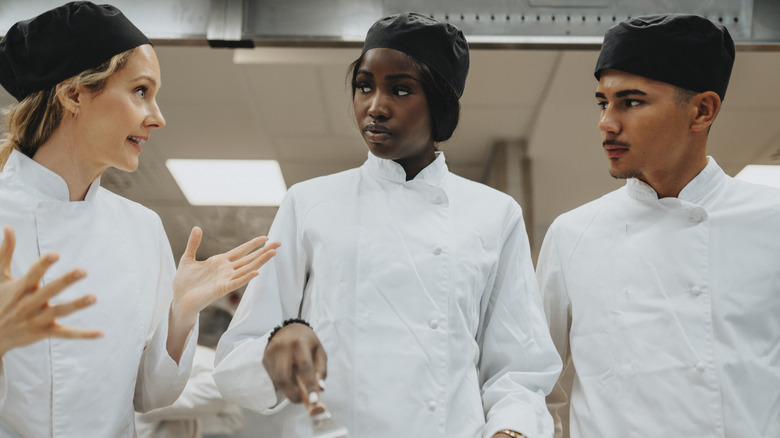How Stage Shifts Help Restaurants Hire Staff
In high-pressure kitchens, hiring isn't just about resumes; it's about how someone moves, communicates, and holds up when the tickets start flying. That's where stage shifts come in. A stage (rhymes with lodge) comes from the French stagiaire, meaning trainee. A cheffy word added to the dictionary in 2023, it is defined as "a usually unpaid internship in a professional kitchen that is part of a chef's training" (per Merriam-Webster).
If the term sounds familiar, it might be because you heard it on Season 3 of "The Bear" when (spoiler) Richie does a week-long stage at the real-life Chicago fine dining spot Ever. There, he learns how to properly polish forks as he absorbs a new standard for hospitality.
Though many stages are indeed longer-term unpaid internships at well-respected restaurants, these days, the term also commonly refers to a short trial shift that lets both sides assess whether the fit is right. Restaurants observe energy, skills, and stress management; workers get a reality check before committing. When structured with clear expectations, reasonable hours, and mutual respect, stage shifts can benefit everyone, allowing the kitchen to make a smarter hire and candidates to gain valuable real-world experience.
How staging is evolving, and why that's good for restaurants and workers
Traditionally, staging was seen as a rite of passage: unpaid, unstructured, and often grueling. It was how aspiring chefs got their foot in the door and how they picked up essential restaurant terms, from "86'd" to "on the fly."
However, the script is changing. Some restaurants are building short, structured stage shifts directly into the hiring process, with clear tasks, feedback loops, and pay for the hours of work — regardless of if the cook is later hired or not. For kitchens still navigating burnout and turnover, it's a practical rethink of an old system.
While a stage might still feel like a job audition, it's also a way to reduce turnover. Restaurant owners want cooks who know the flow and won't crumble during the Friday night rush when they get in the weeds. Cooks want to know they're not signing up for chaos or a toxic workplace dynamic. Think of it like dating before moving in ... only with more knives and fewer feelings. Done right, these short trial shifts can give both sides clarity and help restaurants build stronger, more sustainable teams without relying on unpaid labor.

